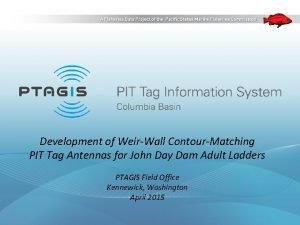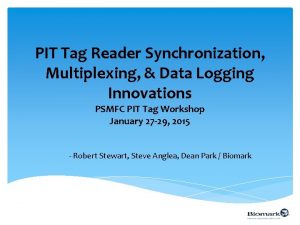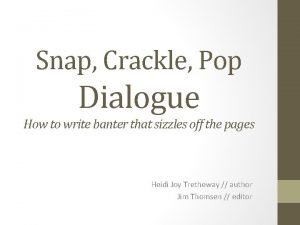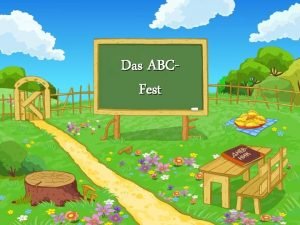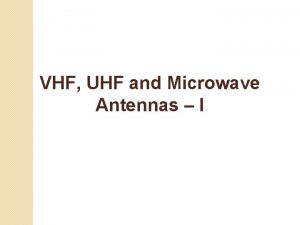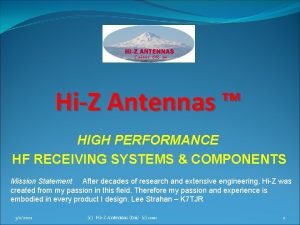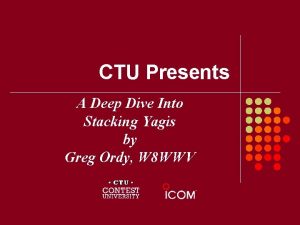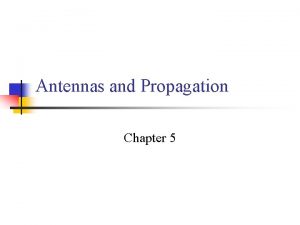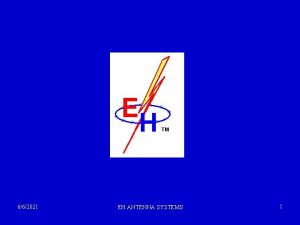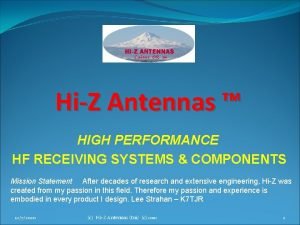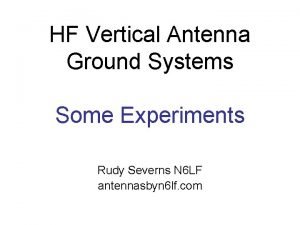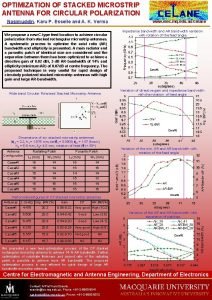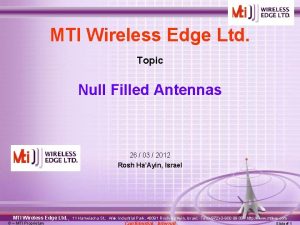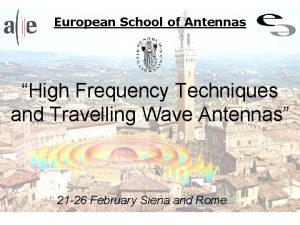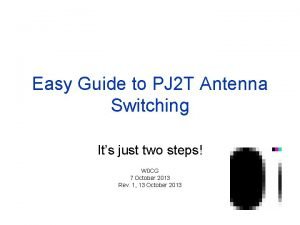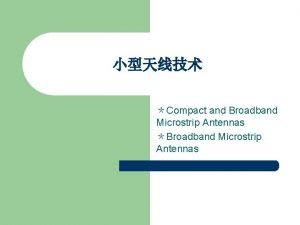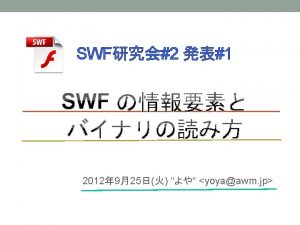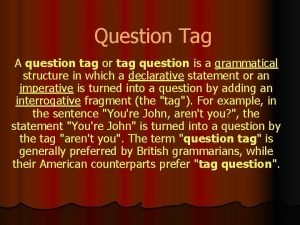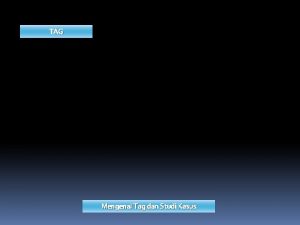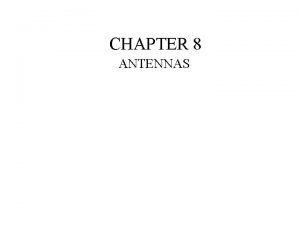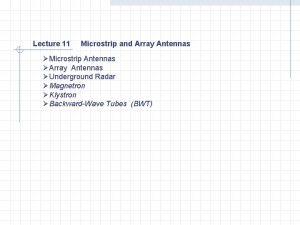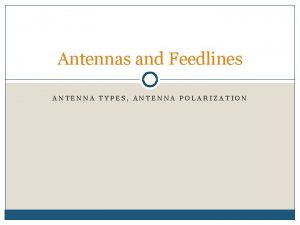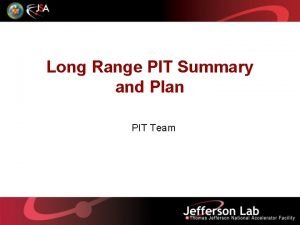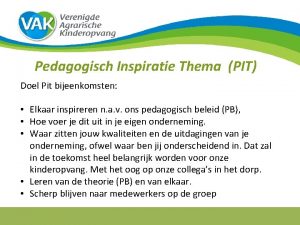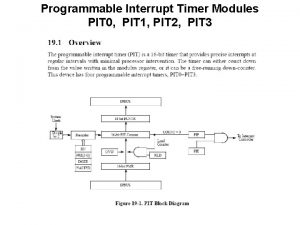Development of WeirWall ContourMatching PIT Tag Antennas for



















- Slides: 19

Development of Weir-Wall Contour-Matching PIT Tag Antennas for John Day Dam Adult Ladders PTAGIS Field Office Kennewick, Washington April 2015

Background • Fisheries researchers in the Columbia River Basin (CRB) recognized a need for PIT tag detection in the North and South ladders at John Day Dam. John Day is the last dam in the Lower CRB without adult PIT tag detection. Note the near 100% PIT tag detection efficiencies at the Columbia River Basin locations.

Background • After several visits to John Day, it was determined the existing infrastructure surrounding the North and South counting window locations would require extensive renovation and would not be cost effective to install PIT tag antennas. John Day North Counting Window John Day South Counting Window

Background • In 2012, PSMFC successfully developed a thin body ferrite tile antenna in the PSMFC Kennewick Lab. • In 2013 -14, these thin body style antennas were successfully installed in counting window locations at The Dalles, Little Goose and Lower Monumental dams.

Background • After a complete review of all other installation options, the overflow and orifice weirs were chosen as the best target locations. • Antenna development surrounding the overflow and orifice weirs was initiated. • In November 2014 a design was proposed that would have raised the water level in the weir. Today we present the “Weir -Wall Contour-Matching PIT Tag Antennas” which will not raise the water levels. • The following slide contains the conceptual drawing demonstrating how four antennas would be installed on any existing overflow weir wall.

Fish Ladder Concrete Work Side View Cutaway No-cut Overflow Antenna (previously presented) Weir-Wall Overflow-Contour PIT Tag Antennas installed.

Fish Ladder Concrete Work • Minimal concrete cutting would be required. • Concrete to be removed is shown in translucent orange.

Conceptual Drawing of Proposed Overflow and Orifice Antennas are one-piece assemblies for short installation time. Overflow antenna Orifice Antenna Orifice is blocked, not a passage route

In the Summer of 2014, A Thin Body Overflow Antenna was Developed by Kennewick PSMFC Staff and Tested at the Pasco NOAA Facility. Antenna Benefits: • Antenna is a Ferrite Tile Thin Body Flat-Plate design. • Installation, with minimal concrete cutting, provides no change in weir water levels. • Antenna is contoured to match the geometry of the weirs overflow notch. • Designed to fit the entire width of the weir wall notch. • Antenna design is effectively immune to ferrous materials that may be in the weir notch and adjacent walls.

Thin Body Overflow Antenna Developed and Tested Antenna Benefits: • Minimal hydraulic disruption. • Ease of installation. Drop in bolt on design. • Antenna and shield are pre-fabricated and are designed with minimal site fabrication required. • Projected detection efficiencies near 100%. • Antenna is constructed of fish friendly highly durable, long lasting copolymer plastic. • Debris passes over the antenna rather than through it. • Only two weir walls will need be to outfitted per ladder.

• • • Exploded View Weir-Wall Contour-Matching PIT Tag Antenna Shield antenna to be delivered as one complete assembly. Designed to copy existing overflow notch shape. Aluminum antenna shield mounted on square cut concrete to maintain weir water levels. Contour-Matching Top (Embedded antenna coil) Ferrite Tiles Inner Shell (Embedded ferrite tiles) Support Structure (Electronics cavities) Aluminum Shield (Electrical isolation & physical mounting)

Mock up of John Day Overflow Weir at NOAA test facility in Pasco, WA • A mock weir wall was constructed to simulate a portion of the John Day ladder dimensions. • Rebar was installed under the overflow cap and adjacent wall to simulate the construction of the real ladder walls. 6 Ft span Rebar Ground wire attached to rebar in side top of weir Top of overflow weir

In Water Detection Efficiency Testing of Overflow Antenna Due to the limitations of the water pumps, the raceway had to be filled and then dumped to simulate 12 inches of water over the antenna. 12 inches is the criteria for ladder operation. Video of read range testing on the prototype overflow antenna was removed from this frame to make this Power. Point presentation eligible for email transfer. Contact PTAGIS if you would like to see this video.

• • Orifice PIT Tag Antenna Shield antenna to be delivered as one complete assembly. Designed to fit within existing orifice chamfers Bottom inset flush to floor for lamprey passage and minimal hydraulic disruption Orifice dimensions unchanged Inner Shell (Embedded antenna coil) Electronics Cavity Ferrite Tiles Outer Shell (Embedded ferrite tiles) Aluminum Shield

Proposed Orifice Antenna Design Antenna Benefits: • Antenna is a Ferrite Tile Thin Body Flat-Plate design. • The antenna is approximately 2 inches total thickness. • Antenna maintains the existing 20. 75” high x 22” wide orifice dimensions. • Ease of installation. Inserted bolt on design. • Antenna and shield are pre-fabricated and are designed to bolt in place. • Projected detection efficiencies near 100%. • Minimal hydraulic disruption. • Only two weir walls will need be to outfitted per ladder.

PIT tag Installation and Equipment Costs for the John Day South Ladder Note: Estimate does not include any projected COE engineering support costs.

PIT tag Installation and Equipment Costs for the John Day North Ladder Note: Estimate does not include any projected COE engineering support costs.

Projected Total Cost of Installation Possible cost reductions based on several installation factors. • If space within an existing facility can be allocated for PIT Tag Rooms the cost of purchasing free standing buildings would be eliminated. • The electrical infrastructure estimate may vary considerably depending on the locations of the PIT Tag Rooms (in relation to the antennas) and the location of available power. • Depending on the economic feasibility, installation of fiber optic cables from the ladders to the existing Juvenile Fish Facility PIT Tag Room would eliminate the cost of the two additional PIT Tag Rooms.

Questions or Comments? Gordon Axel 509. 547. 7518 Gordon. Axel@noaa. gov Scott Livingston 509. 735. 2773 Ext. 2 slivingston@psmfc. org Darren Chase 509. 735. 2773 Ext. 3 dchase@psmfc. org Don Warf 509. 735. 2773 Ext. 1 dlwarf@psmfc. org
 Weir pit
Weir pit Pit tag reader
Pit tag reader How to write banter
How to write banter Ein neuer tag und ein neuer morgen
Ein neuer tag und ein neuer morgen Hallo guten tag wie geht es dir
Hallo guten tag wie geht es dir Vhf uhf and microwave antennas
Vhf uhf and microwave antennas K7tjr
K7tjr Stacking yagi antennas
Stacking yagi antennas Antennas and propagation
Antennas and propagation Eh antenna theory
Eh antenna theory Hi-z antennas
Hi-z antennas Hi-q antennas
Hi-q antennas Elevated ground radials for vertical antennas
Elevated ground radials for vertical antennas Nasimuddin+microstrip+antennas
Nasimuddin+microstrip+antennas (“mti wireless edge” or mtiwe) and anten
(“mti wireless edge” or mtiwe) and anten European school of antennas
European school of antennas Pj antennas
Pj antennas Broadband microstrip antennas
Broadband microstrip antennas Fspos
Fspos Typiska novell drag
Typiska novell drag
